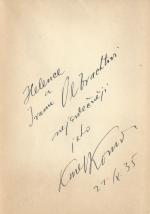Konrád, Stredozemni Zrcadlo / (Mirror of the Mediterranean).
Stredozemni Zrcadlo / (Mirror of the Mediterranean). [Association copy signed / inscribed to Ivan Olbracht]
Paze / Praha, S.K. Neumanovi, 1935. Octavo. 103 pages. Original, illustrated softcover, designed by Vojtech Tittelbach in protective collector’s mylar. First edition inscribed / signed by Karel Konrad to czech writer Ivan Olbracht and his wife Helena Malírová on front free endpaper in 1935. In publisher’s printed wrappers, some browning, uncut pages, else very good.
Ivan Olbracht (born Kamil Zeman) (6 January 1882, Semily, Bohemia – 20 December 1952, Prague) was a Czech writer, journalist and translator of German prose. The son of writer Antal Stašek, Olbracht studied law and philosophy in Prague and Berlin. In 1905, he first began editing a social-democratic workers’ newspaper in Vienna (Historical papers, Delnické listy), and later he did the same in Prague (The people’s right, Právo lidu). In 1921, Olbracht joined the Communist Party of Czechoslovakia and began working as a journalist, primarily for Rudé právo. He was twice imprisoned due to his communist views, first in 1926 (in Slezská Ostrava) and later in 1928 (in the Prague Pankrác Prison). Olbracht was a student of law, which he studied in Berlin and Prague. He left before graduation, however, choosing the career of a journalist. He began work as a journalist in a Czech Social Democratic paper in Vienna, writing for the paper between 1909 until 1916.
When he first began publishing his works, Olbracht was primarily a writer of stories and novels with a psychological theme. This phase of his writing life was before and during the First World War. After the war, however, he shifted his focus on journalism. His works after the War are an experimentation in blending fiction and realism. Olbracht wrote stories concerning the legends and people of sub-Carpathian Ruthenia, as well as reports concerning his journeys into the Soviet Union.
After the War, Olbracht was also increasingly drawn to politics, specially the radical side. In 1920 he lived in Soviet Russia for six months, became a member of the Communist party, and took up the job of editor of its paper Rudé právo. He was arrested for political agitation in 1926 and 1928.
In 1929, together with six other writers, Olbracht signed a protest statement against the new leadership of the Czechoslovak Communist Party. The move resulted in ousting from the party and his editorial post. Removed from his political obligations and without a job, Olbracht turned his attention toward writing. The ensuing years were some of his most productive as a writer. Beginning in 1931 Olbracht started to travel regularly to Podkarpatská Rus, in the east of Czechoslovakia. The region, which was inhabited mostly by Rusyn peasants and Jews, created a deep impression on Olbracht’s work. His experiences there inspired some of his best works. His book, Nikola Šuhaj, Outlaw, published in 1933 was based on a real person. The story spoke of a peasant outlaw who robbed the rich to provide for the poor. The book is widely regarded a masterpiece. It acquired the status of a folktale. Olbracht was awarded the his country’s highest prize for literature for this book.
In 1934, Olbracht co-wrote the screenplay for Marijka nevernice (Marijka the Unfaithful). The following year, he published Hory a staletí (Mountains and Centuries), which was a combination of political ethnography and criticism of what he perceived as the Czechoslovak government’s colonialist policies in Podkarpatská Rus. In 1937 Olbracht’s book Golet v údolí (Golet in the Valley) came out. The book consisted of three interwoven stories about Orthodox Jews. The longest, and best, of the stories was Smutné oci Hany Karadžicové (The Sad Eyes of Hana Karadžicová), a sad tale of a Jewish girl who is ostracized by her village for marrying an atheist Jew. Golet in the Valley was the last of Olbracht’s works. His books set in Podkarpatská Rus are regarded as his best works, reflecting his gift of combining documentary realism and fictional drama.
Fear of persecution drove Olbracht to the small town of Stríbrec during World War II. There he once again joined the communist party and was active in the resistance. He worked for a while in the ministry of information after the war. His writings after the war were limited to adaptations, including retelling of Bible stories for children. (Wikipedia)
Karel Konrád (* 28. März 1899 in Louny; † 11. Dezember 1971 in Prag), war tschechischer Schriftsteller und Journalist.
Nach dem Abitur im März 1917 in Louny (gemeinsam mit Konstantin Biebl) musste er zum Militär und studierte nach der Grundausbildung weiter, zunächst drei Semester Chemie, danach Geschichte und Erdkunde an der Karls-Universität. Keines der Studien beendete er. 1930 gründete er die Zeitschrift Stachel (Trn), die er bis 1933 redigierte, 1925 und 1945 bis 1948 arbeitete er als Redakteur in der Tageszeitung Rotes Recht (Rudé právo), danach bis zu seiner Pensionierung 1957 in den Filmstudios Barrandov. Konrád reiste gerne und besuchte vor allem immer wieder Frankreich, Italien, Polen und Jugoslawien.
Konrad war ein Vertreter der poetischen Prosa. In seinem 1928 veröffentlichten Roman Dinah, handelt es sich um das Schicksals eines in Haft genommenen Mannes, dem es erlaubt wird Plattenspieler zu benutzen und sich in die Stimme der Sängerin Dinah verliebt. In Trennung! (Rozchod!) verarbeitet er seine Jugenderinnerungen mit tatsächlich lebenden Menschen, deren Schicksale jedoch nur in Phantasie leben. Held des Buches ist ein Student, der wegen Militärdienst das Studium abbrechen muss. In Betten ohne Himmel (Postele bez nebes) beschreibt er Jugendliche, die das Leben der Erwachsenen im Spiel nachahmen. (Wikipedia)
- Keywords: Avantgarda · Czech Avantgarde · Czech Avantgarde Illustrator · Czech Literature · Czech Literature – Collection · Inscribed · International Literature – Rare · Library & Collection Building · Signed · Typographie · Typography · Typography Rare · World Literature
- Language: Czech
- Dust Jacket
- Signed/inscribed
- First edition
- Inventory Number: 60142AB
© 2024 Inanna Rare Books Ltd. | Powered by HESCOM-Software












